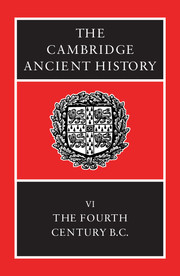Book contents
- Frontmatter
- 1 Sources and their uses
- 2 Sparta as victor
- 3 Persia
- 4 The Corinthian War
- 5 Sicily, 413–368 B.C.
- 6 The King's Peace and the Second Athenian Confederacy
- 7 Thebes in the 360s B.C.
- 8 Regional surveys I: Persian lands and neighbours
- 9 Regional surveys II: the West and North
- 10 Society and economy
- 11 The polis and the alternatives
- 12 Greek culture and science
- 13 Dion and Timoleon
- 14 Macedon and north-west Greece
- 15 Macedonian hegemony created
- 16 Alexander the Great Part 1: The events of the reign
- 17 Alexander the Great Part 2: Greece and the conquered territories
- 18 Epilogue
- Chronological Table
- BIBLIOGRAPHY
- Index
- Map 1: Greece and Western Asia Minor
- Map 9: Egypt
- Map 20: Alexanders campaigns
- References
5 - Sicily, 413–368 B.C.
Published online by Cambridge University Press: 28 March 2008
- Frontmatter
- 1 Sources and their uses
- 2 Sparta as victor
- 3 Persia
- 4 The Corinthian War
- 5 Sicily, 413–368 B.C.
- 6 The King's Peace and the Second Athenian Confederacy
- 7 Thebes in the 360s B.C.
- 8 Regional surveys I: Persian lands and neighbours
- 9 Regional surveys II: the West and North
- 10 Society and economy
- 11 The polis and the alternatives
- 12 Greek culture and science
- 13 Dion and Timoleon
- 14 Macedon and north-west Greece
- 15 Macedonian hegemony created
- 16 Alexander the Great Part 1: The events of the reign
- 17 Alexander the Great Part 2: Greece and the conquered territories
- 18 Epilogue
- Chronological Table
- BIBLIOGRAPHY
- Index
- Map 1: Greece and Western Asia Minor
- Map 9: Egypt
- Map 20: Alexanders campaigns
- References
Summary
In the period between the Peloponnesian War and the accession of Philip of Macedon, it is perhaps the events in Sicily which carry the greatest potential interest. Although in the eastern Mediterranean the military and political battle for the Greeks of Asia Minor continues, Greek civilization there is not in cultural danger; in fact, it continues to expand despite its political subjection. In Sicily it remains unclear whether Greeks, the semitic power of Carthage or some Italian people will come out on top. Politically, Sicily offers a chance to see in operation a possible solution to the Greek political dilemma. The Athenian democracy has failed to expand political control beyond the city state, and Sparta will show that oligarchy is no more successful. In Sicily, monarchy has its chance, and operates on a larger scale than the city state. Dionysius I, with his one-man rule over a large territory, his professional army, and his technological resourcefulness, prefigures the hellenistic period with some clarity. On a different level, it is arguable that much of Plato's political experience is Sicilian experience and that understanding Sicily is a prerequisite for understanding him.
That study of these matters is relatively undeveloped compared to the amount of effort put into mainland Greece in the same period is attributable to the nature of the evidence. A very few references in Xenophon and Athenian orators, three Athenian inscriptions, and the controversial letters under the name of Plato practically exhaust the fourth-century evidence for us, and then we have a long gap until the first century B.C. Even then, the once useful evidence provided by Pompeius Trogus is hopelessly obscured for us by his epitomator Justin.
- Type
- Chapter
- Information
- The Cambridge Ancient History , pp. 120 - 155Publisher: Cambridge University PressPrint publication year: 1994
References
- 6
- Cited by

